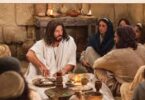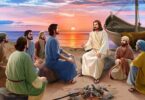25th Sunday of Ordinary Time (Year C)
Scripture: Am 8:4-7; Ps. 113:1-2, 4-6, 7-8; 1 Tim. 2:1-8; Lk. 16:1-13
There are many saints who gave up their wealth for the kingdom of God in the catholic church. Some of them are well known in history such as St. Fabiola of Rome, St. Francis of Assisi, St. Alex, St. Elizabeth of Hungary, St. Katherine Drexel, etc. St. Homobonus is also one of them. He is a special saint about whom you might have not heard much. He was born in the 12th century in Cremona, Italy. His family was rich and wealthy. His father was a tailor and merchant. St. Homobonus was a really good man like his name (Home – man and bonus – good). He expanded his father’s business. Cremona rose to prominence because of his business tactics. He believed that God had given him all the riches as a means of helping others. He lived an inspiring life. He frequently went to church. He lived a balanced life as a catholic businessman. He gave his witness of service to others. He gave a major part of his profit to the poor and the church. He helped to solve many disputes in the village. He was a known figure in Cremona. He died on November 13, 1197 while attending the Holy Eucharist. His last gaze was on the crucified Lord. Despite being a lay man, his countrymen demanded his canonization. He was canonised a little over a year in January 1199. He is the only layman known to be canonized during the middle ages. He becomes a relevant model for us today in the corporate culture. He becomes a model of piety, service and the art of giving. The church honours him as the patron of businessmen. He teaches us how we must share our riches and wealth with others in our lives.
Today’s liturgy of the word has a beautiful message on riches and wealth. They are given to us so that we may use them responsibly for others. The first reading from the book of Prophet Amos. He lived in the 8th century before Christ and is known as the prophet of justice. He spoke against the exploitation of the poor by the rich and the priests. The corrupt businessmen regretted the observance of Sabbaths, which was a day of rest. They waited to get it over so that they could make profit for themselves. They charged high prices and used false weighing scales to exploit the poor. The rich gave loans to the poor on a high interest whereas the law of Moses forbade them to take interest on the loan from the needy (Ex. 22:24-25). The prophet warned them about the impending destruction; God would not tolerate the injustice done to the poor and vulnerable. History tells us that Northern Israel was annexed by the Assyrians. Israel experienced great prosperity during this time but they failed to use their prosperity and wealth for the good of others.
Today’s psalm is a fitting response to the first reading. The psalm is taken from a group of Hallel psalms (113-118). They begin with Alleluia and praise the mighty works of God. The last words of psalm are in total contrast to the first verses of praise. They echo the message of Prophet Amos. God will not abandon the lowly and the poor. He will lift them up from the lowly and make them sit among the princess. God cares for the poor and needy when we fail to assume the responsibilities towards them. God reaches out to the poor when those responsible fail in their duties.
St. Paul reminds Timothy and his congregation that they have responsibilities towards every individual. The early Christian community struggled to come together because there were Jews and gentiles. The Jews never considered gentiles as children of God. Perhaps, there was a problem in the community that they were not even ready to pray for the gentiles. St. Paul requests them to pray for civil authorities and those who are in high position so that they may live in peace. He believed in Jesus Christ as the universal saviour who died for the salvation of the whole world. Thus, his followers had the responsibility towards everyone whether they were followers of Christ or not. The same practice is incorporated in the Holy Eucharist when we make prayers of the faithful after the profession of faith.
The Gospel text amplifies the message of today’s liturgy. Jesus gives us a parable of wicked and dishonest steward. It is quite a unique and difficult parable to understand. It appears as though Jesus is praising the dishonest steward. St. Augustine of Hippo also could not understand it. He said, “I can’t believe that this story came from the lips of our Lord.” We need to have careful reading of this parable. There is a profound message hidden in it. Jesus never praises the dishonesty of the steward but he is inviting us to learn from his life the most important lesson/skill for life.
The dishonest steward knew that he would be thrown out of his job. He worked on his situation. He made his debtors happy by making them re-write their receipts of loan. In those days in Palestinian culture, they made business transactions with the available commodities such as oil, rice, wheat, etc. The wicked and dishonest steward showed his generosity to gain favours for his future. He knew that his relationship with people would save him. The master was well pleased with his promptness in emergency situations. The master must have also been praised for his generosity by the debtors. He could not get rid of the praises of people. Above all, he received his produce which he might have never thought to get very soon.
While comparing the wicked and dishonest steward, Jesus is inviting the children of light (His followers) to have the same skills in life. The most important lesson is that the riches and wealth are meant to share with others. He wants to tell us that when we are honest in dealings, how much more we will be confident to meet our Master of life. God has given us the riches and wealth to help others. If we share our resources and build relationships with others, then it will make our place secure in heaven. We need to be prompt in our approach because we cannot cheat on the giver of all riches and wealth i.e. God.
St. Homobonus, Prophet Amos, St. Paul were honest stewards of God. They were the children of light. They understood that the riches and wealth were meant to share with others. The riches and wealth could be our time, energy, talents, skills, expertise, personal contacts, money, etc. They are meant to be used for others, the poor and needy, the church. Whereas, the rich at the time of Prophet Amos, people under the care of Timothy and the wicked and dishonest steward failed to understand it. They were doomed for eternity. Let us ask ourselves a question; what do I do with my riches and wealth? Do I share them with the poor and needy?






